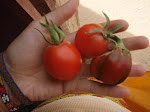First of all, your daughters/sons/friends are fine, albeit probably exhausted by everything that's happened in the weeks since training started. Right now, they are busybusybusy in their 2nd week of learning how to live and work in Niger. They probably miss home, but are so distracted by the difference of Here from There that they don't have any brain space to worry about it as much as you might think. Instead, they're wishing they could tell you all about it, and are writing letters to you by lamplight, letters that probably won't get to you for awhile... I'll try to fill that gap, the month-long gap between when they left home and when you'll hear from them again, by telling you about what they're doing. I hope it helps to put your minds at ease!
Training takes place for ten weeks in and around the town of Hamdallaye, which is about an hour's drive north of Niamey, Niger's capital city. All of the trainees-- they're not considered volunteers until they complete all of their training-- spent their first 2 nights in Niger at the central training center in Hamdallaye, a comfortable hilltop compound equipped with electricity, running water, and a whole staff of cooks, laundry men, gardeners, and official trainers. The entire staff is marvelously competent-- energetic, understanding, patient, and eager to help Americans find their way in Niger. I have never worked with such a compassionate and effective leader as Tondi, who manages all of the training activities.
On their 3rd day here, each of the trainees went home with a host family, where they will live for the next two months. You'll hear a lot about this from the trainees themselves, so I won't insert too much of my own picture in this, aside from saying that this was a good, strong shock to my system. During the day, trainees attend language, cross-culture, health, and technical training sessions. In the evening they are home, playing with kids, practicing their French/Hausa/Zarma, and eating whatever it is that their host mothers have cooked up that day.
At some point in the next month, the trainees will be able to call home (yay!!), an event that everyone here looks forward to SO much. You'll get an email from the PC office in Niamey giving you more details on this! By the time of the phone call, your trainee should know where in Niger she'll be posted, and she'll be close to starting her service as a volunteer.
I'm sure it's hard for you all at home, being out of the loop and not knowing what the heck happened to your people. But rest assured, they're in great hands. There's no place most of us would rather be right now than Niger.

























